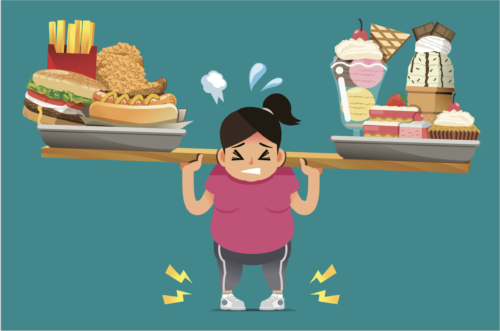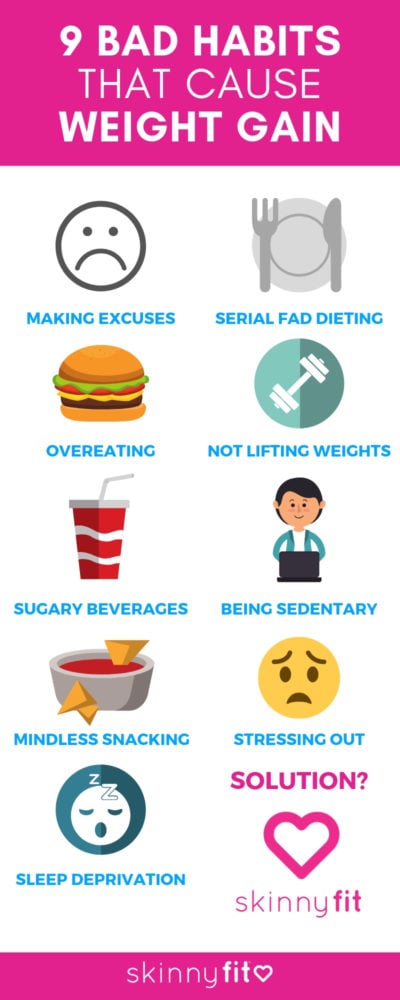Do you ever feel like you’re gaining weight for no reason? Or maybe you’ve already lost weight but you’re starting to gain it back suddenly out of nowhere? Well, if this sounds familiar and you want to know how to stop gaining weight, keep reading… because you’re about to find out the 9 WORST habits that completely destroy your waistline and how you can fix them.
Why You Can’t Stop Gaining Weight
So, why is it that you can’t stop gaining weight? The quick answer is that America is out of balance. On one side of the spectrum, there are over 72% of Americans that are overweight or obese, and the other side of the spectrum is in denial about the obesity epidemic altogether.
Even with a slew of data and statistics that surround the correlation between the American lifestyle and the rise in weight gain, there is still doubt that an epidemic is among us—which is contributing to the problem to begin with.
If we deny there is a problem in the first place, how can we expect to discover a solution?
So, we are going to go over the top 9 worst habits that you need to STOP (that our society continues to tolerate) if you want to learn how to stop gaining weight, for good.

9 Bad Habits That Cause Weight Gain
Remember the time when your favorite jeans used to slip on effortlessly? Well, those days are long gone unless you learn how to kick these 9 bad habits to the curb!
1. Making Excuses
Making excuses is by far, one of the most common bad habits that contribute to unwanted weight gain. Excuses come in various forms like self-justification, limiting beliefs, and even genetic predisposition. Regardless of what type of excuse you use to justify why you keep gaining weight, the excuse alone is enough of an opportunity to take the easy way out and refuse to take responsibility for your circumstances.
Self-justification
The truth of the matter is simple—when your behavior contradicts a core belief, desire, or moral truth, your mind has a tricky way of justifying your decision in order to reduce the discomfort you feel about making that decision.
Let’s say, for example, that you can’t stop gaining weight since the holidays and you really want to lose a few pounds before your upcoming vacation. Now, you know deep down that if you want to stop gaining weight you’re going to have to clean up your diet and exercise—which means, eating out less and going to the gym more.
But lo and behold, a few of your coworkers are going to an impromptu happy hour on your gym night and invited you to come along. You know you shouldn’t go because your vacation is just around the corner—but you don’t want to miss out on all the fun! So you come up with a bunch of excuses to justify why you should go to happy hour instead of the gym.
“I’ll only stay for an hour…” “One cocktail won’t hurt…” “I’ll just workout tomorrow instead…” “My friends will be upset if I don’t go…” “I can’t miss it, I’m expected to be there…”
As the excuses begin to swirl around in your head, suddenly, skipping the gym doesn’t seem so bad! You’ve managed to justify that going to happy hour is more important than going to the gym and, through self-justification, you’ve eliminated any feelings of guilt about skipping the gym.
“99% of failures come from people who have the habit of making excuses.” – George Washington Carver
When it comes to self-justification, your mind is a brilliant negotiator and can easily talk itself out of doing what you know is right without feeling guilty—which can often lead to a behavior that creates undesirable outcomes, like eating a box of cookies while you’re on a diet and then gaining weight as a result.
Limiting beliefs
A limiting belief is another type of excuse that can lead to undesirable outcomes, like unwanted weight gain, for example. A limiting belief is a false truth you tell yourself that constrains you in some way and just by believing them, you limit your success. Here are some common limiting beliefs that can potentially contribute to why one might feel like they’regaining weight for no reason:
“I can’t lose weight because…”
- I have a slow metabolism.
- A healthy lifestyle is too expensive and I can’t afford it.
- Healthy foods are gross.
- I hate working out.
- People should just accept me how I am.
- I don’t have time to exercise.
When you tell yourself these types of false truths, you begin to believe them, thus adopting self-sabotaging behavior that brings you further from your end goal. If you convince yourself that healthy foods are gross, for instance, then you are likely to be pessimistic about eating healthy foods and more optimistic about eating unhealthy foods, thus, less likely to lose weight.
Genetic predisposition
Many people claim their genetics are responsible for weight gain—and while your DNA does play a role in how you break down calories and store fat (which can help determine your susceptibility to becoming overweight or obese), it is not entirely to blame.
The FTO gene has long been associated with heavier individuals and is the gene responsible for regulating how the body either burns calories for heat or turns them into fat. However, a randomized and controlled scientific study conducted by Newcastle University in 2016 claims that there was insufficient evidence to prove that having the FTO genotype affected your ability to lose weight.
In fact, John Mathers, the leader of the study, stated in an interview with Time that no matter how they looked the effects of the gene, whether it was in kilograms of weight lost, BMI, or waist circumference, having or not having the gene didn’t seem to matter. There was no difference between the people with and without the FTO gene and their weight loss (whether they tried dieting, exercise, or weight-loss drugs).
If the genes you inherit aren’t responsible for weight loss, it begs the question, what is responsible for one’s inability to stop gaining weight? Experts suggest that our behaviors, specifically the unhealthy lifestyle choices we make, are to blame.
Linda Spangle, a Registered Nurse, weight loss coach, and author of 100 Days of Weight Loss, makes a great analogy—”It’s like inheriting a house. You’re given the building and the land, but you can decide how you want to redecorate it… Likewise, even if you’ve inherited a tendency toward gaining weight, it’s you who makes the choice about how you’re going to eat and exercise [1].”
How to fix it
If you want to learn how to stop gaining weight, you first have to accept that making excuses is not going to change your circumstances. Refuse to let self-justification, limiting beliefs, or genetics keep you from adjusting your diet and exercise habits so you can lose weight. You are given a choice everyday to either make excuses and accept your circumstances, or make the healthier choice.
For example, SkinnyFit provides premium health and wellness products, along with healthy recipes, workouts, and informative articles to give you as many resources as possible to help you reach your goals. We have a strong community filled with women who have all chosen to show up for themselves and improve their health every single day! SkinnyFit provides endless support and will always have your back.

2. Serial Fad Dieting
A fad diet is just like fashion—it’s “in” one day and “out” the next. It’s a type of “deprivation” diet that promises rapid weight loss in a short amount of time, with little effort. The reason fad diets continuously fail to provide sustainable weight loss results is because they put you in a caloric deficit so low that you’re at a near “starvation level”… which is extremely dangerous! In general, a caloric deficit means that you are consuming less calories than you’re burning, which means you will inevitably lose weight.
The problem is that your caloric intake is so low that you aren’t consuming enough calories or a variety of micro- and macro- nutrients on a daily basis to function properly and optimally. This is usually when the side effects of a fad diet kick in–elevated mood swings and crankiness, dehydration, weakness and fatigue, nausea and headaches, and constipation.
On top of not being able to receive the proper amount of nutrition on a fad diet, when you transition back to a more sustainable diet, the digestive system will have to readjust to breaking down certain foods again, which can cause fat storage that leads to rapid weight gain and bloating.
How to fix it
If you want to stop weight gain, you have to stop fad dieting. As hard as it might be to resist the newest fad diet trend, a healthy, balanced diet that consists of lean proteins, whole grains, healthy fats, and a variety of fibrous vegetables and fruits is the only way to stop gaining weight over the long-term.
A clean eating grocery list is a great way to help you learn what type of foods are most nutritious, the lowest in calories, and will help you to stop gaining weight. By incorporating a variety of healthy, nutrient-dense, foods into your diet, you are ensuring that your are providing your body with nutrients it needs to be healthy.
3. Overeating
It’s no surprise that Americans love to eat—but what’s caused major concern over the last fifty years is the dramatic increase in food portions and its correlation to the American obesity epidemic. Whether it’s restaurant chains adding large and extra large meal options to their menus or even supermarket foods doubling or even tripling their portion sizes, there’s no denying that outrageous portions contribute to the rising weight gain of Americans.
A 2002 study on the contribution of expanding portion sizes related to the US obesity epidemic, conducted by the Department of Nutrition and Food Sciences at New York University, concluded that the increase in food portion sizes since the 1970s have continued to parallel with increasing body weights across the country and now exceed the federal standards.
Additionally, Americans are dining out more than ever before with a national average of 4.3 commercially prepared meals per week. In other words, Americans eat out 4 to 5 times per week, on average [2]—that’s 223.6 meals PER YEAR! Considering how often we dine out and the increase in portion sizes, it’s no wonder we’re experiencing an obesity epidemic!
In fact, the super-sized portions we’ve become accustomed to have actually distorted what we consider to be “normal” portion sizes, making it more difficult to monitor our food portions at home.
How to fix it
So, what can you do stop overeating? The answer is portion control. According to the American Diabetes Association, having portion control means seeing how much you eat, deciding on how much to eat, and cutting back on portion sizes. Similarly, you should educate yourself on what a proper portion is and then track what you consume on a daily basis. Write down everything you eat in a day and approximately how much you eat. You can use this food diary as a way to keep track of your portions, your total calories, and compare the list to the serving size guidelines. From there, you can monitor and adjust your food intake accordingly.
If you’re new to portion control, we recommend including SkinnyFit Snack Attack into your daily routine to help you stop weight gain. Snack Attack is a fat-burning appetite suppressant that curbs cravings, fires-up your metabolism, and burns fat effectively throughout the day. The advanced formula is scientifically formulated to meet the unique metabolic needs of women so no matter what your goal is, Snack Attack has your back!

4. Neglecting The Weight Room
Did you know that the more muscle you have on your body, the more fat you burn at rest? In fact, for every pound of muscle you have on your body, you burn about 50 additional calories without even doing anything! In theory, this sounds awesome, right? Well, the only problem is the weight room can be super intimidating if you’re unfamiliar with resistance training. According to a study by Fitrated, 58% of people avoid resistance training altogether out of fear of being judged for performing an exercise incorrectly!
If you’ve ever thought to yourself, “I keep gaining weight even though i don’t eat much”, this might be why you feel like you’re gaining weight for no reason.
Muscle is a metabolically active compound which means it contains fat-burning tissue. Your body is in a constant state of change and your metabolism is how your body regulates that change. For example your metabolism is responsible for breaking down and building molecules and tissue in your body and when you lift weights, you are building up muscle tissue, which increases your metabolism. But because muscle is metabolically active, it can naturally decrease over time if you’re not building or maintaining it on a regular basis. Meaning, in order to minimize the naturally occurring muscle loss, you need to be physically active every day—and this includes lifting weights.
How to fix it
If you don’t each much but still feel like you’re packing on a few pounds, you should take the opportunity to reassess your workout routine. By adding even two or three days of weight lifting to your workout routine each week can decrease your chances ofgaining weight for no reason. You should also switch up your fitness routine every six to eight weeks to prevent a plateau (a sudden dramatic decrease in noticeable results).
Additionally, If you want to walk into the weight room with a new-found sense of confidence, you need to confront your anxiety about weight lifting.
5. Drinking Your Calories
Believe it or not, beverages are one of the biggest hidden calorie culprits that cause unwanted weight gain. The most popular consumed beverages in America being soda, beer and spirits, milk, fruit drinks, and sports drinks–with an average of calorie count of 147 calories per serving.
Many of these beverages are loaded with added sugars and artificial sweeteners, like high fructose corn syrup, and can contain upwards of nearly 19 teaspoons of added sugar, PER SERVING! According to the USDA, the maximum recommendation of added sugar intake for an average American is about 12 teaspoons per day and the average beverage contains 13 teaspoons of added sugar per serving. So, if you consume more than one sweetened beverage per day, or anything else that contains added sweetener, you are more likely to experience unwanted weight gain when compared to someone who avoids sweetened beverages altogether.
Similarly, consuming alcohol can contribute to unwanted weight gain as well. Alcohol itself contains 7 calories per gram and is considered “empty calories” because the calories provide no nutritional value whatsoever and your body can’t use them for energy. For example, a standard alcoholic drink contains about 10 grams of alcohol (not including sugar, carbs, etc.) which adds up to 70 calories that your body won’t use—meaning, your body stores these calories as fat!
How to fix it
Cutting back on your drinking habits is a sure-fire way to stop gaining weight. Here are a few tips to help limit your intake of sweetened beverages and alcoholic beverages:
- Drink one glass of water before drinking any other beverage
- Track the consumption of all your beverages in a food log
- Grab a smaller version of the beverage
- Replace your beverages with SkinnyFit Detox
SkinnyFit Detox contains 13 powerful superfoods that help reduce bloating, release toxins, and help you feel pounds lighter. It’s naturally sweetened with peach powder and provides the perfect amount of flavor. Not only will your kidneys and waist line thank you, but by switching to SkinnyFit Detox you can look and feel better than ever.

6. Not Moving Enough
Ever since the technology boom of the 1990s and early 2000s, Americans have become dramatically sedentary. We were a society that was once known for being service-based (walking, moving, lifting, etc.) and now, we are an information-based economy (technology, internet, convenience, etc.) which means more desk jobs and less movement throughout the day.
The U.S. government recommends adults get at least 2.5 hours of moderate-intensity aerobic exercise each week or one hour and 15 minutes of vigorous-intensity activity, or a combination of both. Adults should also engage in muscle-strengthening activities at least twice per week.
According to a recent survey by the Center for Disease Control and Prevention, only 20.6% of Americans meet the total recommended amount of exercise. This means that nearly 80% of Americans aren’t moving enough due to a sedentary lifestyle.
How to fix it
Getting 30 minutes of exercise each day might sound difficult, especially if you have a busy schedule, struggle with joint pain, or simply lack the motivation to get started. There are a lot of very simple things you can add to your daily routine to ensure you are getting enough exercises to stop weight gain.
- Take a 15 minute walk, twice a day
- Do an at-home bodyweight workout
- Drink SkinnyFit JumpStart to boost motivation, focus, and endurance
- Take the stairs instead of the elevator/escalator
7. Mindless Snacking
Eating when you aren’t hungry can certainly explain why you feel like you’re gaining weight. Most people, 94% of Americans in fact, snack on a daily basis. The problem with snacking is that more often than not, you aren’t conscious of how much you’re actually consuming, which can add up to a lot of calories at the end of the day. I mean, when you’re snacking, chances are you’re just grabbing right out of the bag of chips and munching away until you’re no longer hungry.
Similarly, emotional eating often triggers patterns of overeating and mindless snacking. According to the American Psychological Association, 34% of adults say they generally overeat and tend eat unhealthy foods to manage stress levels.
Regardless of your motivation to snack, mindless snacking is a bad habit you have to quit if you want to learn how to stop gaining weight.
How to fix it
Using a food log or food journal is a great way to be more mindful of your eating habits. However, I recommend writing out how you feel when you eat. Are you bored? Sad? Depressed? Happy? Hungry? Acknowledging this question can help you identify your motivation for wanting to eat and also control your weight. We also recommend incorporating SkinnyFit Super Youth to your daily routine. Super Youth contains healthy collagen peptides and proteins to help curb cravings and keep you feeling full and satiated.

8. Stressing Yourself Out
If you’re feeling like you’re gaining weight for no reason, it’s very likely that stress is a contributing factor. As it turns out, stress is responsible for the release of a hormone called cortisol, or the “fight or flight” hormone.
Increased levels of cortisol can actually trigger your insulin levels to spike and then suddenly drop your blood sugar causing cravings for fatty, sugary foods. This is typically when stress-eating, or emotional eating, comes into play.
Stress is brought on by a variety of factors—from financial stress, work-related stress, stress from having poor health, family issues, or even stress brought on by worrying about the future. By learning how to manage your stress you will simultaneously figure out how to stop gaining weight throughout the process.
How to fix it
The first thing you should do if you’re stressed out is to try to relax. Find somewhere where you can be alone and sit quietly without any distractions. Take a moment to clear your head and focus your attention on something calming—like your favorite memory, or favorite place to visit. Once you’ve diffused your stress with something happy, focus your attention to your breath. Take a big, diaphragmatic breath in through your nose, about 3-5 seconds, and exhale slowly through your mouth. Your exhale should be twice as long as your inhale, about 7-10 seconds. Repeat your breathing for 5-10 minutes until you’re relaxed.
We also recommend incorporating one cup of SkinnyFit ZzzTox, daily, anytime you want to relax. ZzzTox is a calming blend of 8-superfood ingredients that fight off stress-related weight gain, help you relax, and get better rest. Let the relaxing and soothing aromas of chamomile and lavender ease your stress away.
9. Not Getting Enough Sleep
A lack of sleep is the cause for more than a cranky mood—it’s actually a contributing factor in weight gain. According to Michael J. Breus, Ph.D., a Clinical Psychologist and both a Diplomate of the American Board of Sleep Medicine and a Fellow of The American Academy of Sleep Medicine, “Sleep deprivation causes changes to the hormones that regulate hunger and appetite. The hormone leptin suppresses appetite and encourages the body to expend energy. Sleep deprivation reduces leptin while another hormone, ghrelin, increases and triggers the feelings of hunger [4].”
It is recommended that Americans get an average of 7 hours of sleep each night but it is reported that only 1 in 3 Americans actually do!
How to fix it
The best way to ensure you get your Zzz’s is to stick to a sleep schedule. Adapting to a regular sleep routine like going to bed at the same time and waking at the same time can help your body improve its internal clock. Additionally, we recommend practicing a relaxing bedtime ritual that includesSkinnyFit ZzzTox, exercising daily or practicing bedtime yoga, and ensuring you have a comfortable sleep environment. This includes a comfortable mattress and pillow and a room with minimal light and noise.

RESOURCES:
[1] Spangle, Linda. 100 Days of Weight Loss. SunQuest Media: 2006. Shape.com. Web. 25 January 2019.
[2] https://www.zagat.com/b/2018-dining-trends-survey-highest-tippers-social-media-habits-and-more[4]
–https://thesleepdoctor.com/2018/04/10/sleep-deprivation/
-https://www.who.int/news-room/fact-sheets/detail/obesity-and-overweight
–https://www.bmj.com/content/354/bmj.i4707
–https://time.com/4501742/if-you-cant-lose-weight-dont-blame-your-genes/
–https://www.ncbi.nlm.nih.gov/pmc/articles/PMC1447051/
–https://www.nhlbi.nih.gov/health/educational/wecan/eat-right/distortion.htm
–https://www.telegraph.co.uk/women/womens-life/11198758/Sport-England-Women-dont-exercise-for-fear-of-being-judged.html
–https://health.gov/dietaryguidelines/2015/guidelines/